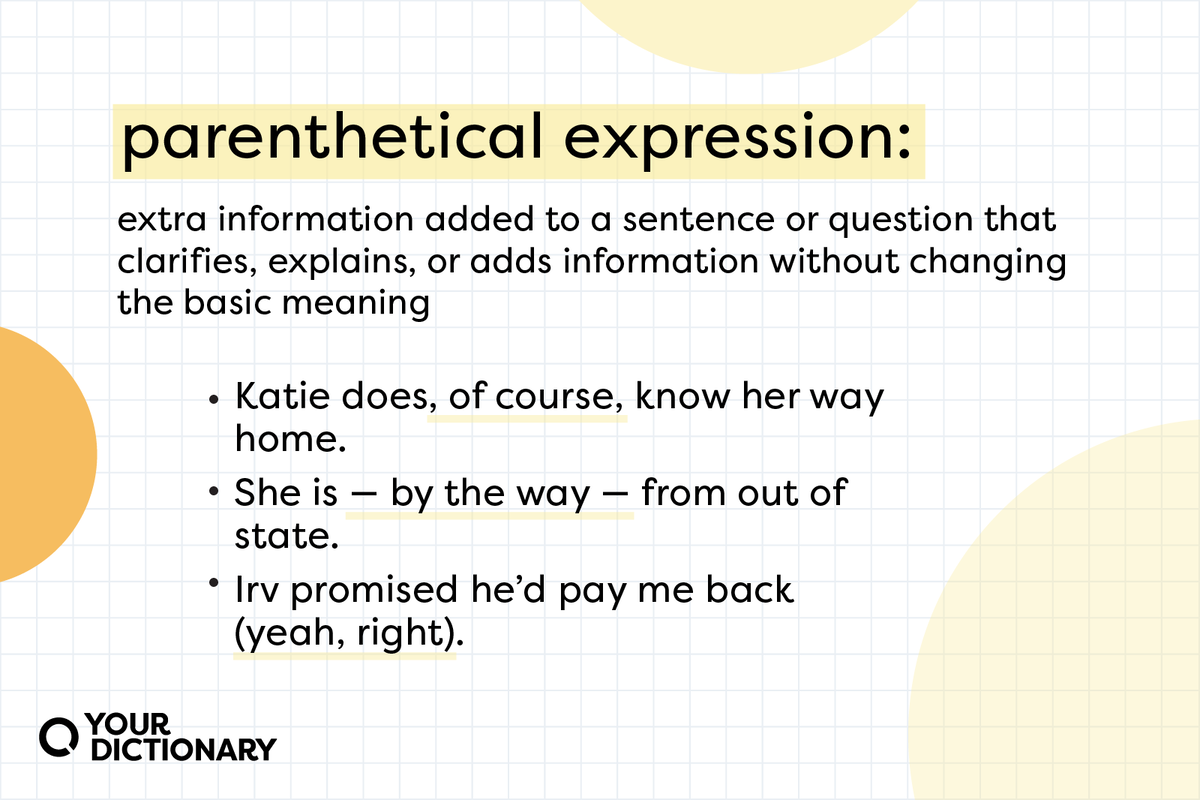
A parenthetical expression is extra information added to a sentence or question that clarifies, explains, or adds information without changing the basic meaning. Think of it as an aside providing readers with helpful information that they don’t absolutely have to have, but that is helpful to them.
Also known as parenthetical phrases, parenthetical statements, or just parentheticals, these expressions can be a single word, several words, a full sentence, or several sentences. However, they are usually non-essential, meaning that the sentence would still make sense without them.
How To Set Off Parenthetical Expressions
So how do you indicate that a parenthetical expression is separate from your sentence?
The easy answer is “put parentheses around it,” which is true. But parentheses aren’t the only punctuation mark you can use for this purpose.
Commas and dashes are also effective ways to insert a parenthetical expression into a sentence (and it’s still called a parenthetical expression, even if you don’t use parentheses).
- Use parentheses to make your statement more secretive or quiet.
- Use commas to make your sentence look more normal or formal.
- Use dashes to draw attention to your statement.
Examples of Parenthetical Expressions
Adding a parenthetical expression to your sentence can make it more informative, more interesting, or more appropriate for your tone (especially if that tone is a little funny).
You can use commas, em dashes — and yes, parentheses — to punctuate your parentheticals.
- Katie does, of course, know her way home.
- Soda is bad for your teeth (to name just one reason not to drink it).
- My sister — an expert magician — has misplaced her white rabbit.
7 Types of Parenthetical Expressions
What goes inside your parentheses (or commas, or em dashes) depends on the type of sentence you’re writing.
Although there are no grammar rules that determine what you can or cannot add, parenthetical expressions generally fall into seven different categories.
Common Phrases as Parenthetical Expressions
People often add non-essential common expressions to a sentence or question for emphasis.
- She is — by the way — from out of state.
- High-sugar foods like candy, for example, have little nutritional value.
- I will (of course) return your sweater next week.
Contrasting Statements as Parenthetical Expressions
You can use a parenthetical expression to emphasize that one group is included and another is not.
- The girls — not the boys — were excited to try the new microscope.
- Food in Louisiana, not the other southern states, seems to be very spicy.
- I traveled north (not south) in order to get to the rendezvous point.
Appositives as Parenthetical Expressions
An appositive is a noun phrase that adds detail about another noun in the sentence.
- My new puppy — a chocolate lab — is extremely active.
- Stan helped me move my desk, an enormous piece of furniture, upstairs.
- I cut a slice of pie (a giant chunk) to eat while the kids are outside.
Relative Clauses as Parenthetical Expressions
When a non-essential or nonrestrictive relative clause (beginning with which, who, whom, or whose) modifies a noun, it can be offset as a parenthetical expression.
- My aunt, whose home I’m buying next month, sent me a nice card.
- The old art museum (which used to be the governor’s mansion) is closing.
- Mr. Tucker — who was my high school science teacher — received the Nobel Peace Prize.
Conjunctive Adverbs as Parenthetical Expressions
Conjunctive adverbs, words that join other groups of words or modify other words, can also function as parenthetical expressions.
Typically, they’re offset by commas instead of parentheses or em dashes, since they’re modifying part of the sentence.
- Above all, what matters is that every person exercises the right to vote.
- The students in my class, however, will not have homework during the fall break.
- She is, accordingly, going to have to face the consequences of her actions.
Direct Address as a Parenthetical Expression
When directly addressing someone, a speaker might interject the person’s name to indicate that they’re the “you” a sentence is addressing.
Like conjunctive adverbs, direct addresses use commas rather than other forms of punctuation.
- Susie, please make sure that Kim is properly trained on the new software.
- If you don’t listen to me, young lady, you are going to find yourself in big trouble.
- When you talk to your grandmother, son, you need to use a respectful tone.
Asides as Parenthetical Expressions
Finally, you’ll see a writer or speaker use parenthetical statements to make an aside to the reader (just like this).
In informal writing, you may even see a question mark or exclamation point all by itself in parentheses to indicate the writer’s feeling of confusion (?) or surprise (!).
- Irv promised he’d pay me back (yeah, right).
- The neighbors apologized for letting their dog out (but didn’t say anything about the mailbox the dog destroyed).
- Jim has two tickets to the Super Bowl (!), and he’s taking one friend.
If the parenthetical expression comes at the end of the sentence, it's important to follow punctuation rules on whether periods go inside or outside the parenthesis.
Tips for Using Parenthetical Expressions
Using the right parenthetical expression can make your writing informational or entertaining. But how can you tell if you really need one?
Add a parenthetical expression if:
- it adds important (but not necessary) information to your sentence
- it makes your sentence funnier and more interesting to read
- it adds clarity to a sentence, making it easier to understand
Don’t add a parenthetical expression if:
- you just used one somewhere else in the paragraph
- you’re writing a formal document or paper
- the sentence doesn’t make sense without it (then it’s just part of the sentence, not a parenthetical expression)